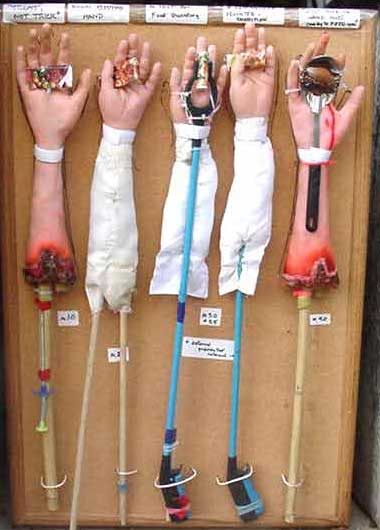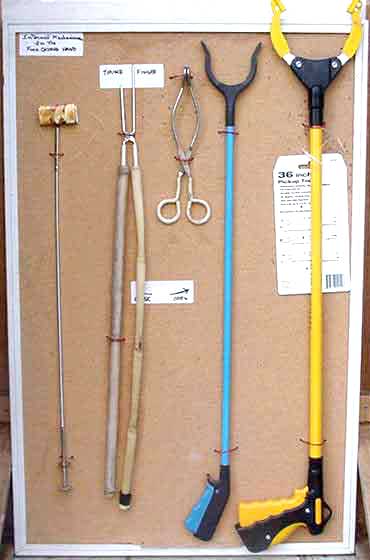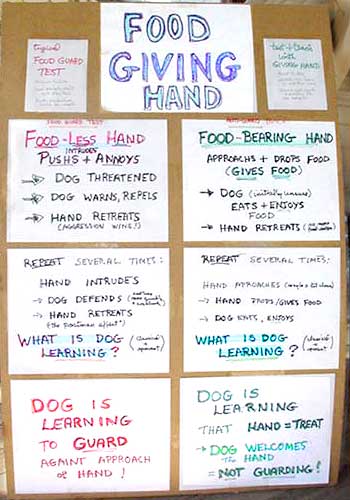home | what's new |
Food Guarding Testing and Trainingusing a food-GIVING fake hand |
The method of testing dogs for tendency to food guard using an intrusive and annoying fake hand that is used at many shelters is very unfair to the dog. There's a better way, using a food-GIVING fake hand to test the dog and to teach the dog that guarding is unnescessary.
| SITE INDEX | BOUVIER | RESCUE | DOG CARE |
| PUPPY REARING | TRAINING | PROBLEMS | WORKING DOGS |
| BOOKS | VERSE | IMAGES | MISCELLANEOUS |
The method of testing dogs for tendency to food guard using an intrusive and annoying fake hand that is used at many shelters is very unfair to the dog. There's a better way, using a food-GIVING fake hand to test the dog and to teach the dog that guarding is unnescessary. In this article I intend to contrast the two methods in terms of what the dog is learning from each type of experience.
Any time we are interacting with a dog (or watching a dog interact with others or with the environment), we should be asking ourselves three questions.
The usual testing method is highly likely to make the dog feel threatened about a hand approaching his food. The dog learns to be more and more defensive.
Use of a food-giving hand can make the dog feel happy that a hand is approaching his food. The dog learns that there is no need to guard his food against a human hand.
One comment about the use of a latex fake hand rather than the tester's own flesh hand. Use of a fake hand is brilliant, necessary, in shelter conditions and a good idea for rescuers testing a foster dog. In a shelter , sooner or later the tester will encounter a dog who violently attacks the approaching hand. The fake hand feels no pain and is easily replaced. Need I say more ?
I had prepared 3 boards to be used as display at a symposium.
 hands holding food |  mechanisms inside hands |  what is the dog learning comparing intrusive hand to food-giving hand method |
| TESTING with FOOD-LESS INTRUSIVE HAND unfair to dog real people don't act like this (or should be taught not to) can create a problem for adopter | TESTING WITH FOOD GIVING HAND kind to dog adopter can learn to act this way doesn't create a problem for adopter |
| first trial : hand intrudes towards food bowl intrusion escalates until dog reacts when dog reacts, hand retreats effect on dog: dog feels threatened dog warns, tries to repel hand hand retreats | first trial : hand bearing food approaches before dog reacts, ie while dog is still calm hand drops food, then retreats effect on dog : dog may intitially be worried food dropped, dog eats and enjoys after dropping food , hand retreats |
| repeat several times : hand intrudes again dog reacts a bit more vigorously hand retreats effect on dog : dog feels more and more threatened dog defends more vigoursly hand retreats |
repeat several times : hand approaches, possibly a bit closer to bowl hand drops food while dog is still calm hand leaves effect on dog : dog eats and enjoys dog starts to anticipate hand giving treat dog feels happy |
| WHAT IS THE DOG LEARNING ? dog is learning hand = bad, threat to food dog is learning to GUARD |
WHAT IS THE DOG LEARNING ? dog learning hand = good ! gives tasty treat ! dog is learning to NOT GUARD |
The process of teaching with a food-giving hand can be taken further. The dog can be asked to "Sit", thus removing face from bowl (just a very short distance while bowl is still right in front of the dog), before treat is dropped. At that point the dog could be given the treat from the hand. At other times, at later stage, the dog could be asked to leave the bowl, to "Come" just one or two steps to get the treat from the person, probably from the person's own hand. Then the "Come" distance can be increased a step at a time. Another late variation is that the dog is asked to "Come" away from the bowl, do a "Sit-Wait" or "Down-Wait" while the person goes to the bowl and adds several extra super-yummy treats, then releases the dog to return to the bowl and eat. Or while the dog is on a "Sit-Wait" right next to the bowl, the person picks up the bowl (use tongs or fake hand the first few times) and adds several extra-yummy treats and immediately gives the bowl back to the dog, saying "eat , eat". (Teaching the dog a cue of permission to eat is a good idea. It can become a cue of encouragement to eat that you may need to use if the dog is not feeling well or simply because the food is a strange new one for the dog.)
Through all of this, your judgement of the dog's body language will tell you when it will be safe for you to use your own hand instead of the fake one. Err on the side of caution if the dog came to you with a history of food guarding.
Most of the dogs who "failed" the Intrusive Hand test at the shelter will soon cease to food guard in their adoptive home if they are simply allowed to eat in peace. These dogs were never really hard core food guarders, but were reacting to the stress of being in the shelter or recovering from a pre-shelter period of hunger or were getting over the bad effects of the Intrusive Hand test. Just be aware of the dog's body language as you happen to walk near his bowl. If in doubt, if you need to pick up the bowl, use a pair of BBQ tongs to pick it up. Then start the process of approaching and tossing food to the dog. Some version of my Food Giving protocol.
There are a few dogs who, usually for a reason that will remain unknown, remain hard core food guarders. Once you accept that this is something that you can't change --- recite the Serenity Prayer if you need to remind yourself -- these dogs are easy and safe to live with so long as you don't forget that you must not reach towards the dog while he is eating or holding food. Simply feed the dog on the other side of a stretch gate or inside a crate. Once the bowl is empty and the dog has lost interest in it, he will not guard the empty bowl. If you need to take something that might be food or smell food-ish to the dog, be smart and use BBQ tongs or any other long -reach pick-up tool.
Have compassion for this dog. He does have some reason, even though you will never find out what that reason is.
My dog Shady was one of these dogs. He was a wonderful sweet dog in every other way.
return to top of page| site author Pam Green | copyright 2003 |
| Pam's e-mail address has changed | tips on site use |
| created 2016 | revised 3/20/2020 |
| return to Welcome page | go to the Farewell page with links to other sites |